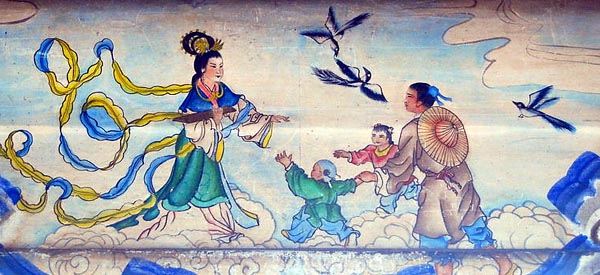 |
| The reunion of the Weaver Girl and the Cowherd (Wikipedia) |
Note: Two lovers--actually, stars--are banished to opposite sides of the river called the Milky Way, and can meet only once a year.
Get Ready: Do you know any other myths or legends based in astronomy?
There's nothing I like better than a holiday with a great story behind it. Throw in a couple of star-crossed lovers and you have a celebration for the ages.
Tanabata is celebrated in Japan every July 7, when young people write wishes on slips of paper and hang them on bamboo trees, girls wishing for more skill at sewing and crafts, boys wishing for better handwriting.
The story is this: Orihime, the "Weaving Princess," was the daughter of Tentei, the King of Heaven. She used to weave beautiful clothes along the banks of the Amanogawa, the "River of Heaven" known to us as the Milky Way.
Because her father admired her work, she applied herself to it day in and day out. Unfortunately for her, this left her little time for the interests important to a growing girl--including thoughts of romance.
Being a good father, Tentei arranged for her to meet Hikoboshi, the "Cowherd Star," who worked on the other side of the Amanogawa. (Incidentally, Orihime is the star Vega, and Hikoboshi is Altair, both among the brightest stars in the night sky).
When the two youngsters met, it was love at first sight, and they soon married. However, this meant that Orihime stopped weaving, and Hikoboshi let his cows range wild--which sent Tentei into a rage.
So he confined the two lovers on either side of the starry river. Though he forbade them to meet, the despondent Orihime begged her father to relent. Moved by her tears, Tentei agreed to let them meet once a year, on the seventh day of the seventh month--but only if she had finished her quota of weaving.
When the first year had passed, the lovers discovered that no bridge crossed the Amanogawa. How, then, were they to meet? A flock of magpies came to the rescue, creating with their wings a bridge over which Orihime could pass.
Tradition says that if it rains on Tanabata, the magpies will be unable to come, and the lovers must wait another year to meet.
By now, some readers in China or Korea must be saying, "Wait a minute! I know that story!" Yes, in fact, it originated in China, though the Japanese version has a few twists. The holiday is called there Qixi; the girl is named Zhinü and the boy Niulang. It is celebrated according to the lunisolar calendar; it is considered the "Chinese Valentine's Day." The Koreans, who borrowed it like the Japanese did, call it Chilseok and, like the Chinese, celebrate it according to the lunisolar calendar.
--------Read more: https://en.wikipedia.org/wiki/Tanabata
Practice: Match the term to its definition below:
- applied (oneself)
- cowherd
- despondent
- flock
- for the ages
- Milky Way
- quota
- relent
- star-crossed
- weaving
- one who tends cattle
- an apparent line of stars in the sky, formed by the galaxy we're in
- worked hard
- a group of birds
- doomed by fate
- depressed; extremely sad
- making cloth
- to be remembered for a long time
- change one's mind
- a prescribed amount
Answers are in the first comment below.
Submitted to the Shenzhen Daily for May 15, 2017


Answers to the Practice: 1. c; 2. a; 3. f; 4. d; 5. h; 6. b; 7. j; 8. i; 9. e; 10. g
ReplyDelete